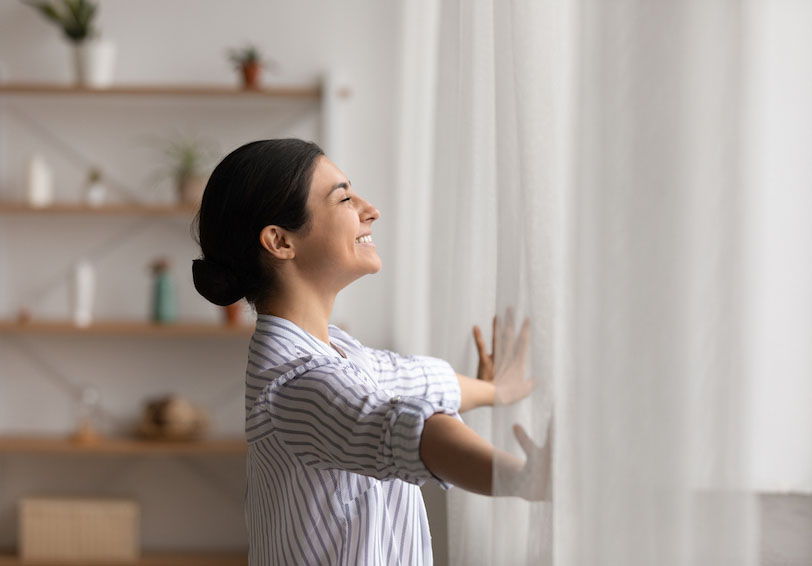When you get enough natural light, you sleep better at night, feel more alert during the day, boost your mood, and perform at your best.
How your internal clock works
Looking at the clock and seeing it’s 0700 hours is not the information your brain uses to get up and go. To wake up, you need to see a bright light, preferably sunlight, unless you have access to a light box that’s much brighter than artificial lights used in homes and offices.
When the environment is dark or has low light, your brain produces the hormone melatonin. Its main function is to tell your brain it's dark outside and time to prepare your body for sleep. The light you see in the morning gets through your eyes and shuts down melatonin production to help wake you up. Your brain then regulates all body functions accordingly to help you perform throughout the day. Here are some ways you can use light to optimize your performance.
Adjust your internal clock
You can use exposure to sunlight to fine-tune your internal clock with nature's light-dark cycle for better performance in multiple scenarios.
- Wake up earlier. Seeing light first thing in the morning can help you adjust to a new wake-up schedule quickly. If it’s before dawn, try using an artificial light box that offers adequate brightness (10,000 lux).
- Adjust to a new time zone. Exposure to sunlight as soon as you wake up can also make adapting to a new time zone faster and easier, especially when traveling eastward. You can benefit from this practice when you “spring forward” at the beginning of daylight saving time.
- Recover from shift work. After a few rounds of shift work, it might be tough to go back to your old schedule. Daily exposure to sunlight at your previous regular wake-up time can help you adjust more quickly.
Increase alertness during the day
Exposure to early-morning sunlight can boost your performance and energy levels too. The more intense light you see when you wake up, the sharper your melatonin levels drop, giving you more energy and alertness throughout the day.
It's common to feel tired between 1300 and 1500 hours. If you struggle with that early afternoon slump, take a short break and go outside for 5–15 minutes to help restore your alertness and improve mental performance.
Sleep better at night
The more light you get throughout the day, the better you sleep at night. Early exposure to morning sunlight triggers earlier release of melatonin at night, allowing you to fall asleep more easily. Seeing sunlight during the day makes it easier for your brain to detect nighttime too, even if you keep lights on after sunset. But if all you see throughout the day is artificial light, the much smaller difference in light intensity can't really help your brain recognize when nighttime starts. (Full daylight provides 10,000 lux of light intensity. A home lamp gives just 500 lux on average.)
Light from screen-based devices is also particularly bad for internal clock regulation and sleep quality. Try turning your smartphone or tablet off about 2 hours before bed for better sleep.
Boost your mood
Exposure to bright natural light increases the production of serotonin, a brain chemical that regulates mood and supports restful sleep. Having enough serotonin can help you feel happy and improve your sense of well-being.
If sunlight is available, it should be your preferred source of light. Get enough safe sun exposure with these helpful tips from HPRC.
- Put first things first. Try to create the habit of getting sun exposure as soon as you wake up.
- Head outdoors. The sunlight you get through windows is filtered and less intense than the light you get when you’re outside. When possible, go outside for maximum benefits.
- Don't look directly at the sun. It is dangerous and can damage your eyes.
- Shade is fine. You can stay in a shaded area to regulate your internal clock plus get all the other benefits.
- Aim for at least 15 minutes. On sunny days, just 15 minutes of sunshine is enough to completely shut down melatonin production and wake up your brain. On overcast days, try to stay outside longer when you can. Natural light on an overcast day is still better than artificial light.
- Get sun exposure several times a day. The more light, the better to align your internal clock and improve your sleep. Try to get some light exposure around sunset too. Your eyes use light patterns at dusk to tell your brain night is coming, which can also help improve sleep.
- Be safe. Wear protective clothing or sunscreen to buffer against the sun’s harmful rays.
